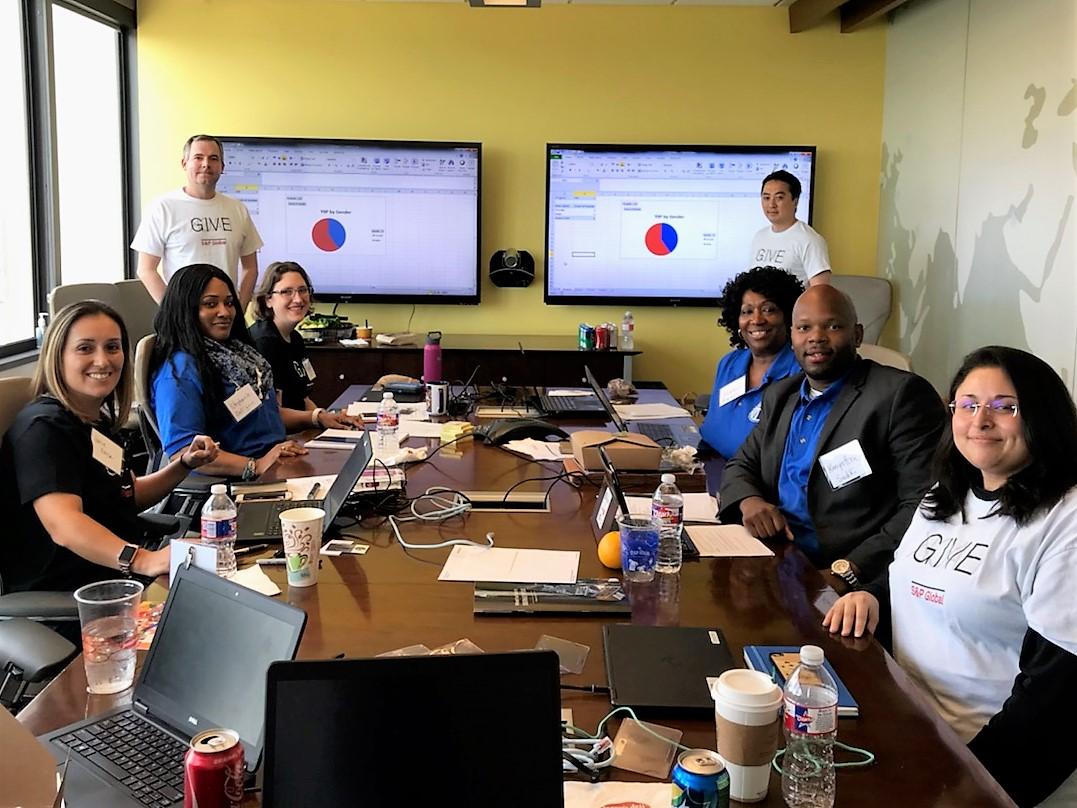Cross-Sector Skill Sharing in Action
by Marjie Bland

In previous posts, we’ve shared a concept we call “The Knitting Factor” along with the three key conditions – panoramic perspectives, skill sharing, and sticky relationships – that enable effective skills-based volunteer engagements. While all three conditions are important for a successful partnership, the concept I get most excited to see in action is skill sharing.
Common Impact defines skill sharing as a two-way talent exchange where both pro bono professionals and their nonprofit partners are learning from each other. In my experience sourcing and supporting skilled service projects for our corporate and nonprofit clients, it is when our partners recognize the knowledge and expertise that they each bring to the table and seek to proactively learn from one another that real long-term change takes place. The change we see is not just for the communities we support, but also for the volunteers and nonprofit leaders participating in these skills-based volunteer projects.
Some of my favorite examples of skill sharing in action are from Common Impact projects both old and new, including partnerships with Fidelity and The Research Triangle Foundation of North Carolina (RTP) as well as The Center for Transforming Lives; and, most recently, a partnership between S&P Global and the Sexual Assault Resource Agency (SARA).
S&P Global and SARA
At a recent day of service event, a group of volunteers from S&P Global supported a data reporting and story-telling project with Sexual Assault Resource Agency (SARA), an organization focused on eradicating sexual violence through advocacy, education, and counseling. The team developed a new approach to fundraising and awareness messaging for SARA by reviewing their already robust metrics and helping them identify key points to utilize in telling stories through data. The SARA team left with a deeper understanding of their metrics and data, along with tools for crafting a compelling narrative to potential funders, while the volunteers from S&P gained knowledge about the deep impact of the prevention work taking place in their community. Stay tuned for our upcoming case study that takes a deeper dive into how the team helped turned data into tangible stories!Fidelity Investments & The Research Triangle Foundation of North Carolina
Although the Fidelity Investment team was located near the Research Triangle Foundation of North Carolina, the organizations first worked together through a skills-based volunteer program focused on technology. The Salesforce integration project offered an opportunity for both the corporate and nonprofit teams to learn from each other and share knowledge. In addition to gaining a deeper understanding of the Salesforce platform, both organizations walked away with a new appreciation for agile project methodology, taking this emerging project management process back to their respective organizations for future technology implementations. Fidelity Investments & The Center for Transforming Lives
Another volunteer team from Fidelity Investments helped The Center for Transforming Lives develop a new website to effectively showcase the organization’s work. While the Fidelity team introduced The Center to the benefits of agile management, the Center introduced Fidelity volunteers to their nimble, start-up culture, enabling both groups to become even more adept at shifting priorities and responding effectively to ever-changing project scopes and schedules. Both teams also walked away with better customer service and client relations skills as they became experts at crafting long-term, mutually beneficial relationships. We are excited to share more personal stories and reflections from our work on the effectiveness of skill sharing in the coming months. Look for interviews from volunteers, nonprofit leaders and others who have leveraged their experience in skills-based volunteerism to hone their professional expertise and community knowledge.

